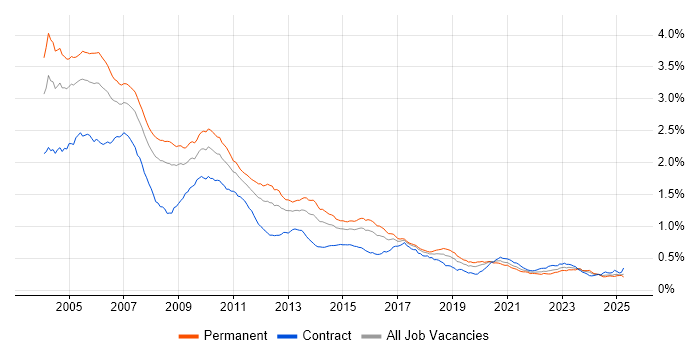C++ Developer
UK
The median C++ Developer salary in the UK is £95,000 per year, according to job vacancies posted during the 6 months leading to 28 February 2026.
The table below compares current salary benchmarking and summary statistics with the previous two years.
| 6 months to 28 Feb 2026 |
Same period 2025 | Same period 2024 | |
|---|---|---|---|
| Rank | 529 | 539 | 549 |
| Rank change year-on-year | +10 | +10 | +145 |
| Permanent jobs requiring a C++ Developer | 142 | 132 | 278 |
| As % of all permanent jobs in the UK | 0.20% | 0.28% | 0.37% |
| As % of the Job Titles category | 0.22% | 0.31% | 0.39% |
| Number of salaries quoted | 87 | 43 | 187 |
| 10th Percentile | £45,000 | £52,500 | £32,500 |
| 25th Percentile | £51,250 | £75,625 | £45,000 |
| Median annual salary (50th Percentile) | £95,000 | £120,000 | £60,000 |
| Median % change year-on-year | -20.83% | +100.00% | -4.00% |
| 75th Percentile | £100,000 | £132,500 | £90,000 |
| 90th Percentile | £140,000 | £174,000 | £125,500 |
| UK excluding London median annual salary | £55,000 | £62,500 | £55,000 |
| % change year-on-year | -12.00% | +13.64% | -4.35% |
All Permanent IT Job Roles
UK
For comparison with the information above, the following table provides summary statistics for all permanent IT job vacancies. Most job vacancies include a discernible job title that can be normalized. As such, the figures in the second row provide an indication of the number of permanent jobs in our overall sample.
| Permanent vacancies in the UK with a recognized job title | 64,045 | 43,160 | 71,846 |
| % of permanent jobs with a recognized job title | 91.47% | 91.32% | 94.74% |
| Number of salaries quoted | 40,457 | 23,120 | 55,854 |
| 10th Percentile | £29,250 | £32,500 | £28,500 |
| 25th Percentile | £38,000 | £45,000 | £39,280 |
| Median annual salary (50th Percentile) | £55,000 | £60,000 | £55,000 |
| Median % change year-on-year | -8.33% | +9.09% | -8.33% |
| 75th Percentile | £75,000 | £80,000 | £73,750 |
| 90th Percentile | £95,000 | £100,000 | £92,500 |
| UK excluding London median annual salary | £50,000 | £55,000 | £50,000 |
| % change year-on-year | -9.09% | +10.00% | -4.76% |
C++ Developer
Job Vacancy Trend
Historical trend showing the proportion of permanent IT job postings featuring 'C++ Developer' in the job title relative to all permanent IT jobs advertised.

C++ Developer
Salary Trend
Salary distribution trend for C++ Developer job vacancies in the UK.

C++ Developer
Salary Histogram
Salary distribution for jobs citing C++ Developer over the 6 months to 28 February 2026.
C++ Developer
Top 9 Job Locations
The table below looks at the demand and provides a guide to the median salaries quoted in IT jobs citing C++ Developer within the UK over the 6 months to 28 February 2026. The 'Rank Change' column provides an indication of the change in demand within each location based on the same 6 month period last year.
| Location | Rank Change on Same Period Last Year |
Matching Permanent IT Job Ads |
Median Salary Past 6 Months |
Median Salary % Change on Same Period Last Year |
Live Jobs |
|---|---|---|---|---|---|
| England | +36 | 141 | £95,000 | -20.83% | 14 |
| London | +14 | 103 | £100,000 | -16.67% | 8 |
| UK excluding London | +21 | 38 | £55,000 | -12.00% | 7 |
| Work from Home | +35 | 32 | £80,000 | -20.00% | 5 |
| South East | +6 | 24 | £50,000 | -23.08% | 1 |
| East of England | +19 | 8 | £80,000 | +100.00% | 3 |
| North of England | -3 | 6 | £57,500 | -4.17% | |
| North West | 0 | 4 | £57,500 | -4.17% | |
| Yorkshire | - | 2 | - | - |
C++ Developer Skill Set
Top 30 Co-Occurring Skills & Capabilities
For the 6 months to 28 February 2026, C++ Developer job roles required the following skills and capabilities in order of popularity. The figures indicate the absolute number of co-occurrences and as a proportion of all permanent job ads featuring C++ Developer in the job title.
|
|
C++ Developer Skill Set
Co-Occurring Skills & Capabilities by Category
The following tables expand on the one above by listing co-occurrences grouped by category. They cover the same employment type, locality and period, with up to 20 co-occurrences shown in each category:
|
|
||||||||||||||||||||||||||||||||||||||||||||||||||||||||||||||||||||||||||||||||||||||||||||||||
|
|
||||||||||||||||||||||||||||||||||||||||||||||||||||||||||||||||||||||||||||||||||||||||||||||||
|
|
||||||||||||||||||||||||||||||||||||||||||||||||||||||||||||||||||||||||||||||||||||||||||||||||
|
|
||||||||||||||||||||||||||||||||||||||||||||||||||||||||||||||||||||||||||||||||||||||||||||||||
|
|
||||||||||||||||||||||||||||||||||||||||||||||||||||||||||||||||||||||||||||||||||||||||||||||||
|
|
||||||||||||||||||||||||||||||||||||||||||||||||||||||||||||||||||||||||||||||||||||||||||||||||
|
|
||||||||||||||||||||||||||||||||||||||||||||||||||||||||||||||||||||||||||||||||||||||||||||||||
|
|||||||||||||||||||||||||||||||||||||||||||||||||||||||||||||||||||||||||||||||||||||||||||||||||
